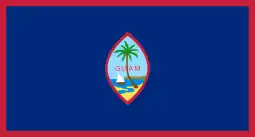Seaton Schroeder
Seaton Schroeder (17 August 1849 – 19 October 1922) was an admiral of the United States Navy.
Seaton Schroeder | |
|---|---|
 | |
| Born | August 17, 1849 Washington City, U.S. |
| Died | October 19, 1922 (aged 73) Washington, D.C., U.S. |
| Place of burial | Congressional Cemetery, Washington, D.C., U.S. |
| Allegiance | |
| Service/ | |
| Years of service | 1864–1922 |
| Rank | Rear admiral |
| Commands held | Vesuvius Yosemite Brutus Virginia Atlantic Fleet |
| Battles/wars | American Civil War Spanish–American War World War I |
Biography
Schroeder was born in Washington, D.C., the son of Francis Schroeder, the Resident Minister to Sweden. His mother was the daughter of William Winston Seaton, who, with his brother-in-law, Joseph Gales, owned and edited the National Intelligencer. Seaton served as the Mayor of Washington, D.C., from 1840 to 1850.
He entered the United States Naval Academy in 1864, which, because of the American Civil War, was in Newport, Rhode Island. After graduating in June 1868[1] he served with the Pacific Fleet in 1868-69 under Admiral John Rodgers in screw sloop, Benicia, and fought in the Salt River near Seoul, Korea. His sea tours took him to Alaska, Japan, and the Philippines in Saginaw, to the West Indies in Canandaigua, and on a world cruise on Swatara.
Marriage and family
Schroeder married Maria Campbell Bache Wainwright on January 16, 1879. Maria Wainwright, born March 14, 1856, in Washington, D.C., came from a family of several American statesmen — she was the great-great-granddaughter of Benjamin Franklin, the great-granddaughter of Treasury Secretary Alexander J. Dallas, the granddaughter of Texas legislator Richard Bache, Jr., a niece of Vice President George Mifflin Dallas, the daughter of naval officer Richard Wainwright, and the sister of Admiral Richard Wainwright. She died in 1925 in Jamestown, Rhode Island.
Career
After specializing in hydrographic duties for 11 years, he spent two years in the Office of Naval Intelligence (ONI) where he helped develop the Driggs-Schroeder rapid-fire gun in partnership with Navy Commander William H. Driggs. He returned to sea in 1890 as the Commanding Officer of Vesuvius. In 1893, he began a three-year tour as an ordnance officer for the Naval Gun Factory at the Washington Navy Yard and as the recorder of the Board of Inspection and Survey, joining the Board as a member in 1894.
Following his appointment as executive officer of the battleship Massachusetts (BB-2), he participated in the American blockade of Santiago, Cuba, during the Spanish–American War and was advanced three numbers in rank "for eminent and conspicuous conduct in battle" during five engagements between 31 May and 4 July 1898.
He was appointed Naval governor of Guam on 19 July 1900, and there commanded Yosemite and later, Brutus (AC-15). On 1 May 1903, Schroeder became Chief Intelligence Officer of the Navy. He assumed command of Virginia (BB-13) upon her first commissioning on 7 May 1906 and afterwards commanded various divisions in the Atlantic Fleet.
Promoted to rear admiral in 1908, he hoisted his flag on Connecticut (BB-18) when he took command of the Atlantic Fleet on 8 March 1909.
Two months later, Schroeder was assigned to the Navy General Board. Schroeder was placed on the retired list on 17 August 1911 and retired to his home in Jamestown, Rhode Island.
Rear Admiral Schroeder was recalled to active duty in 1912 to prepare a new signal book, and again in World War I to serve as Chief Hydrographer and the Navy representative on the United States Geographic Board. He died at the Naval Hospital, Washington, D.C., on 19 October 1922.[2]
Namesake
In 1942, the destroyer USS Schroeder (DD-501) was named in his honor.
References
- Notes
- "US Navy Officers: 1778-1900 (S)". history.navy.mil. Retrieved 4 November 2010.
- "Adm. Seaton Schroeder (1849-1922)". findagrave.com. Retrieved 4 November 2010.
- Bibliography
- Seaton Schroeder, A Half Century of Naval Service (New York and London: D. Appleton, 1922).
- This article incorporates text from the public domain Dictionary of American Naval Fighting Ships. The entry can be found here.
External links
| Wikimedia Commons has media related to Seaton Schroeder. |
| Wikisource has original works written by or about: Seaton Schroeder |
- My Days on the Albatross by Lt. Seaton Schroeder
- DiGiulian, Tony Navweaps.com 6-pdr gun Marks 1-13 (includes Driggs-Schroeder weapons)
| Military offices | ||
|---|---|---|
| Preceded by Richard P. Leary |
Naval Governor of Guam 1900–1901 |
Succeeded by William Swift |
| Preceded by William Swift |
Naval Governor of Guam 1901–1903 |
Succeeded by William Elbridge Sewell |
| Preceded by Charles D. Sigsbee |
Head of the Office of Naval Intelligence (Chief Intelligence Officer) May 1903–April 1906 |
Succeeded by Raymond P. Rodgers |
| Preceded by Charles S. Sperry |
Commander-in-Chief of the U.S. Atlantic Fleet 1909-1911 |
Succeeded by Hugo Osterhaus |
